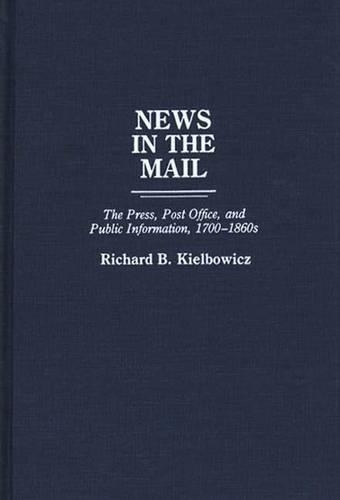
News in the Mail: The Press, Post Office, and Public Information, 1700-1860s
(Hardback)
Publishing Details
News in the Mail: The Press, Post Office, and Public Information, 1700-1860s
By (Author) Richard Kielbowicz
Bloomsbury Publishing PLC
Praeger Publishers Inc
11th December 1989
United States
Classifications
Tertiary Education
Non Fiction
News media and journalism
Media studies: journalism
383.4973
Physical Properties
Hardback
221
Width 156mm, Height 235mm
510g
Description
Until telegraph lines spanned the continent in the 1860s, the post office and the press worked together as the most important mechanism for distributing news and public information. Public policy linked these complementary communication agencies; the post office provided free and low-cost news-gathering services for the press as well as subsidized delivery of publications to readers. News in the Mail charts the relationship between the press and post office from colonial times through the Civil War. The book explains why the federal government underwrote the circulation of printed matter and how the postal policies governing public information reflected the cultural tensions of the early and mid-nineteenth century. News in the Mail not only looks at the government's role in disseminating news and promoting communication, but also examines the structure and implications of the early U.S. communication system. This book is a valuable source for those interested in journalism, communications history, the history of federal policies and operations, postal history, and nineteenth-century American social history.
Reviews
. . . His book provides a satisfying and comprehensive review of the linkages between news industries and government that resulted in the establishment of postal distribution policies that played a major role in promoting communication and the newspaper and magazine industries. . . . This book is an important contribution on the role of state intervention in the print industries and provides understanding of the importance of such economic policies on the development of communications industries and cultural exchange in a nation.-Journal of Media Economics
Kielbowicz's authority has been well established by his earlier work in this area. Now he presents a comprehensive history of the developing postal system through the developing newspaper publishing industry. . . . It is thoroughly researched and draws on an impressive collection of primary sources. . . . The book is an excellent and important library resource for multiple groups and deserves a place on graduate reading lists.-Choice
Quick, name some things frequently attributed to the Post Office. How about rapidly escalating letter rates and inconsistent service But did you know that in the 1700s and 1800s, the Post Office had a major impact on magazine formats, content, publiction dates and circulation patterns as well Those are just some of the interesting findings in Richard B. Kielbowicz's well-researched book about the Post Office's historical role in disseminating news and promoting national communication. His study is relevant both to newspaper historian and to journalists because it demostrates throughout that some of today's problems in the mass communication field are not new al all... ...what is covered in this book is well done. The Post Office and its impact on the press would seem to be the most mundane of subjects, but Kielbowicz brings to life and shows its importance. His book is definitely worth reading.-Newspaper Research Journal
." . . His book provides a satisfying and comprehensive review of the linkages between news industries and government that resulted in the establishment of postal distribution policies that played a major role in promoting communication and the newspaper and magazine industries. . . . This book is an important contribution on the role of state intervention in the print industries and provides understanding of the importance of such economic policies on the development of communications industries and cultural exchange in a nation."-Journal of Media Economics
"Kielbowicz's authority has been well established by his earlier work in this area. Now he presents a comprehensive history of the developing postal system through the developing newspaper publishing industry. . . . It is thoroughly researched and draws on an impressive collection of primary sources. . . . The book is an excellent and important library resource for multiple groups and deserves a place on graduate reading lists."-Choice
"Quick, name some things frequently attributed to the Post Office. How about rapidly escalating letter rates and inconsistent service But did you know that in the 1700s and 1800s, the Post Office had a major impact on magazine formats, content, publiction dates and circulation patterns as well Those are just some of the interesting findings in Richard B. Kielbowicz's well-researched book about the Post Office's historical role in disseminating news and promoting national communication. His study is relevant both to newspaper historian and to journalists because it demostrates throughout that some of today's problems in the mass communication field are not new al all... ...what is covered in this book is well done. The Post Office and its impact on the press would seem to be the most mundane of subjects, but Kielbowicz brings to life and shows its importance. His book is definitely worth reading."-Newspaper Research Journal
Author Bio
RICHARD B. KIELBOWICZ is an Assistant Professor of Communications at the University of Washington. He has held a postdoctoral fellowship at the Smithsonian Institution and has served as a consultant on the history of communication policies for government and business. His articles have appeared in Administrative Law Review, Journalism Quarterly, Journal of the Early Republic, Canadian Review of American Studies, and the Harvard Journal of Law and Public Policy, among other publications.
